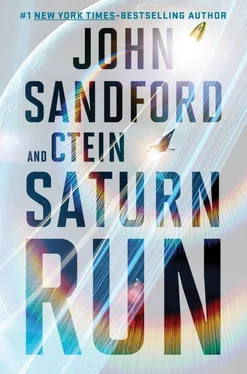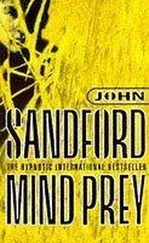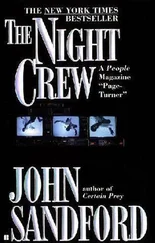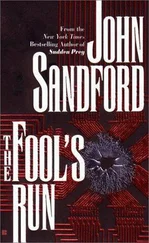Cui: “Sir, I would request that I be allowed to lead the first contact to the planetoid.”
Zhang said, “I was thinking of doing that myself. However, you may be right: we need decisive short-term thinking there, rather than a more leisurely process. Put yourself down to lead the planetoid team. What about the other team?”
Cui leaned almost imperceptibly toward Zhang and lowered her voice just a notch. “Sir, thank you for allowing me this opportunity. For the other team leader, I would suggest Duan Me, as a way of forestalling, mmm, personnel difficulties.”
Zhang nodded: “Do that. Your recommendation suggests to me that you may actually have a future in the navy.”
“Thank you, sir.”
“How long will it take you to draw up your crew list and give me a prospectus on your investigations?”
Cui held up her slate. “Sir, I need to put my name at the head of the planetoid list. Otherwise, you could have it in ten seconds. As is, it will take me perhaps a minute to transmit it to you.”
“Excellent, Cui. You do that. I’m going down to the maintenance bay.”
Because the crew didn’t do just one thing at a time, Cui had managed to signal to the prospective members of her crew, and Duan’s, to make themselves ready for their separate missions.
There wasn’t much to do, other than to check the EVA suits and vehicles. Cui would take the tug to the planetoid: they had measured the extruded landing shelf and determined that the tug would fit.
Duan would take a separate group in the shuttle to investigate the antimatter storage units and the service modules known as ants.
They waited until the Nixon disappeared behind the bulk of Saturn, on one of its outward spirals, and launched the shuttle and the tug within minutes of each other. All communications would be deeply encrypted.
Cui took the tug directly into the landing shelf and put it down. Having watched the news broadcasts from the Nixon , they knew the process, and Cui led the crew members through the air lock, and into the main room.
Ahead of them, they saw a machine that resembled an old-time jukebox, such as those they’d seen in museums in Shanghai. Letters formed in the air above the jukebox, and without waiting for the Chinese script to form, Cui said, “We bring you greetings from the People’s Republic of China.”
The jukebox said, “Mandarin. I speak Mandarin. What do you wish to know?”
“Do you have anything to say to the people of China?”
“Yes.”
“What would that be?” Cui asked politely.
“Hello, people of China.”
____
Zhang watched the shuttle go with some apprehension. Duan was not impetuous, but she was terribly ambitious. An ant would be coming back with them, whether or not it wanted to. He was not sure that an ant was worth the risk. Duan had been told emphatically that she was not to insist, but Duan was ambitious.
Zhang went back to the bridge to watch.
The scopes and radar watched as Duan and the shuttle attempted to match speeds with one of the ants. If they could do that, they could simply pull the alien craft aboard, and bring it back. The ants, however, eluded the shuttle, apparently with an effective proximity control that steered them away whenever the shuttle got too close; and the ants were much more maneuverable than the Chinese craft.
After a few fruitless attempts, the shuttle moved on to investigate one of the moonlets. A few minutes later, there was a burst of traffic from Duan. “Arrived, no incidents. Unpacked. All fine.”
Excellent, thought Zhang. Right on schedule.
Cui went directly to the technology.
“We are told that the humans who just left established an I/O connection between your computers and ours. Can we use that?”
“Yes.”
“What kind of information was transmitted to those humans?”
“They used four trade points to obtain scientific findings in physics, chemistry, and biology. They also received technological information regarding the engineering of interstellar capabilities appropriate to this facility. That information is available to all visitors.”
“Including construction of antimatter manufacturing and storage facilities?”
“Yes.”
“Where is the I/O port?”
“There is a hallway opening to your right. I/O equipment, including that left by the first humans, is there.”
Cui turned to Wong, the senior tech, and said, “Let’s go look.”
____
The Chinese scientists sent to investigate the moonlets began with surface readings, which showed faint gamma emissions from inside the moonlet. They’d quickly congregated as close to the source as they could get. Although the surface of the moonlet was covered with what appeared to be natural regolith, like any normal moonlet, the soil was studded with plates, protuberances, and sockets, none of whose function was at all obvious to the scientists. In addition, faint light splayed across the regolith, as though the surface of the moon were one giant computer display.
When the scientists brought microscopes to bear on the surface, they discovered it was covered with small organelles, most likely extraordinarily sophisticated nanobots. They seemed to operate like a loose mesh network, neighbor communicating information to neighbor.
Samples of the regolith, including myriad bots, were scooped into isolation canisters. The scientists were delighted to see that the soil kept twinkling, at first with faint random flashes. The flashes started to settle into larger patterns, expanding circles, stripes, checkerboards. Without a signal to drive them, there was no meaning or content to display, but it proved that the bots’ communication network was still functioning.
Duan asked Chang, one of the engineers, what the tech might mean.
Chang grunted and said, “One thing it means is that somebody is going to make another trillion yuan from these things. Just not us. What you’re looking at is microscopic machines. We’ve been talking about them for years but nobody’s got there yet. If we can reverse-engineer these things, we can get fifty years of tech in one leap.”
Duan was pleased by that; still, it wasn’t the big prize. It wasn’t aliens, it wasn’t starships, it wasn’t antimatter technology. Aliens, especially, seemed in short supply. She wondered what Cui was finding on the planetoid.
____
Cui asked, “We would like a summary explanation of the trade items. We were told by the last human group that you would allow us to trade up to eight points, and that they used four of those points, leaving us another four. Is that correct?”
“That is correct. There is a trade computer down the hall to your left. It can send a list of tradable items, and their cost, that is, their score, to the I/O port you are using. You may select from the list.”
“Are these technological items?”
“Most are not. Most are artistic items involving visual and aural arts, items used in food preparation and sensory stimulation.”
Wong said, “I think he just offered us vibrators.”
Cui: “Shut up.”
____
At the moonlet: while the biotechnologists were gathering nanobots from the surface, the seismologists were trying to find out what lay under the surface. What their sensitive microphones heard was disappointing: all of it was mechanical or electronic in nature. Not that any of them knew what aliens were supposed to sound like, but steady, repetitive, monotonous sonic signatures were not the hallmarks of active, intelligent life. Furthermore, no definite entry ports had been found. The few possible ports would accommodate nothing larger than a hamster.
Chang said, “Maybe the aliens are hamsters. I always thought hamsters acted suspiciously.”
Читать дальше








